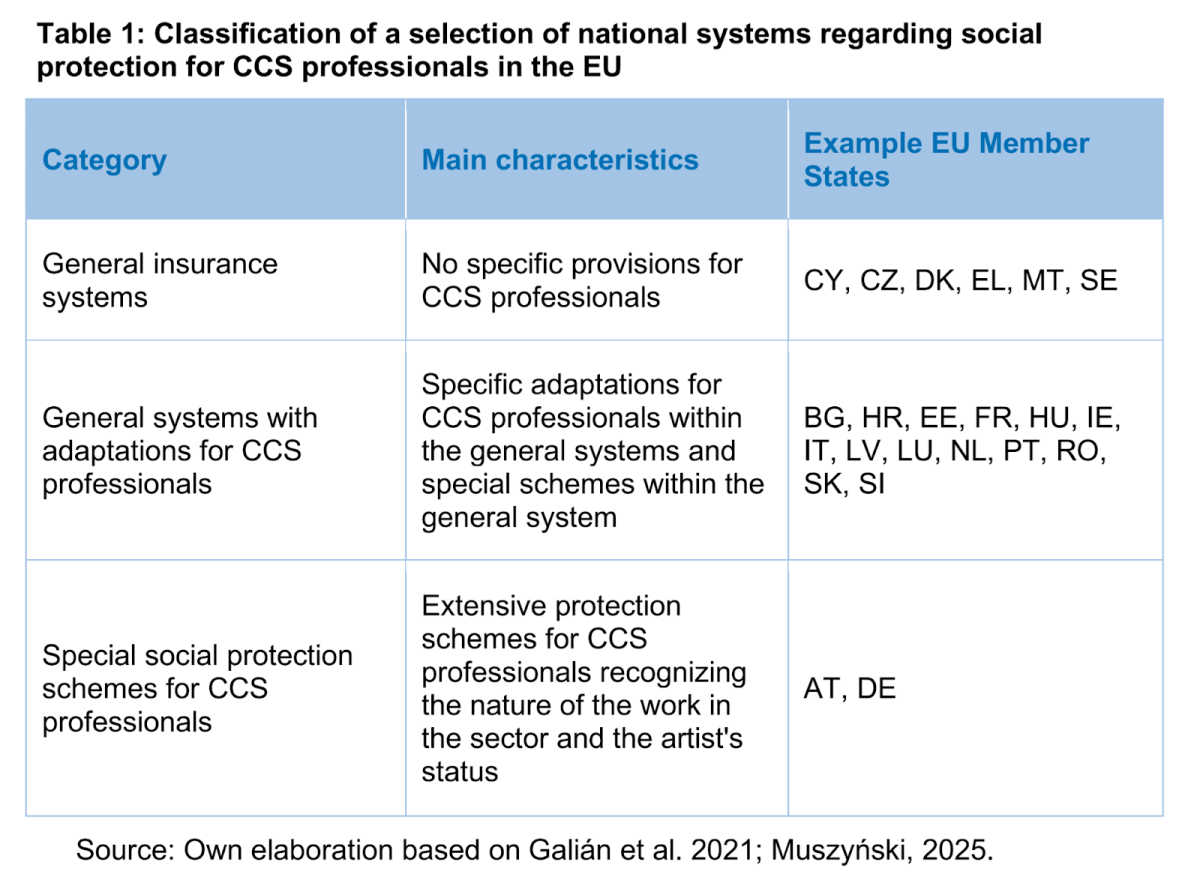There is a "wide variation across the Member States regarding approaches to ensure an effective and adequate coverage of social protection for artists and cultural workers" reads the new report, following the European Commission’s ‘Mutual learning on inclusive social protection for artists and creative workers ’, with the participation of 21 member-states and CCS representatives.
CU talked with CreativeFLIP’s Expert Joost Heinsius*, who participated in the workshop and presented the This is how we work-tool from CreativesUnite, which was received as "very useful".
Employment and Cultural officials worked together for the first time and should do it again
J.H.: "It is the first time that the two different departments for employment and culture, the Commission’s DG Empl and DG EAC respectively, united forces to co-organise something like a workshop on social security for artists and this is important. The same holds true at national level, as the participants from 21 countries who worked together in the workshop for one and a half days, were also representing ministries from both the cultural and the social affairs. It is a step forward that all these people are now informed and on the same page".
CU: What could be the one takeaway from the workshop?
J.H.: "If there is one key takeaway, is that the workshop happened once but should not stop here. Its valuable outcomes will be tested during the next few years and the European Commission should re-organise it in three years to ensure moving forward".
The workshop happened once and should happen again in three years.
The workshop served as part of the Commission’s 13-points response (February 2024) to the legislative initiative brought by European Parliament's EMPL and CULT Committees for an EU framework for the social and professional situation of artists and workers in the cultural and creative sectors (November 2023).
CU: Could artists and cultural workers in the EU have expectations for a "Directive on decent working conditions" for CCS professionals, as it was described in the resolution of the European Parliament?
J.H.: "The Commission at this point does not aim for such a framework. They could have an open directive such as the Minimum Wage Directive but they don’t want to make an exception for the CCS as a sector.
After all, the EU does not have real competence on social security and member states would not allow that. The Minimum Wage Directive is already questioned in courts as not balanced and even though it is designed as an open directive, which means that the countries themselves are to decide how much the minimum wage will be. For example, Denmark considers the Minimum Wage Directive as out of the EU competence. Sweden, Italy and Denmark don’t have a minimum wage.
Apart from that, as portrayed in the report, member-states’ different backgrounds, histories and systems, make it almost impossible to have a unified framework".
From no CCS-specific provisions to an artist's pension of EUR 1623 per month
According to the report, about 7.8 million CCS professionals in the EU, almost 4% of the total workforce, experience fragmented careers, irregular income patterns, and hybrid employment status. “More than 70% of CCS professionals disagreed with the statement that they have sufficient access to social protection”, reads the report.
J.H.: "Currently there are three different approaches of countries towards CCS professionals’ access to social protection. Firstly, there are countries with a general insurance system, who do not want a special system for artists. Secondly, there are cases where the general system is adapted to CCS. Thirdly, there are countries with more specific provisions for social protection for CCS, however sometimes only for groups of artists and not for all cultural workers".
Austria and Germany have extensive CCS protection schemes, while there are countries with no CCS-specific provisions at all (as the workshop was a work in progress, not all countries are included in the following table - click on image to enlarge).

J. H.: "The fact that 21 of 27 member-states were there, participating in the workshop, is a big step already. There is no perfect system yet. Sometimes a system works well or partially well. It’s more about putting pressure on different governments to improve than to look for the ideal situation that does not exist".
The perfect system does not exist. It's more about putting pressure on governments to improve.
Best-practices highlighted in the report include the following (not included in table above):
- Artists in Finland have access to a maximum amount of EUR 1623 per month as a full artist's pension. Pension award criteria include peer reviews on the artistic merits of applicants and their financial situation.
- Lithuanian artists may be granted EUR 1038 per month for a maximum of three months, as a Creative Downtime Payment, when "due to objective circumstances beyond their control, they temporarily lack the conditions necessary for artistic creation and the dissemination of their work".
- In Spain, self-employed artists with annual earnings of less than EUR 3000 are considered of low income and as such, eligible to reduced contributions.
- Germany's Artists’ Social Insurance Fund is financed by 50% through a state subsidy and entities using/distributing art, such as publishers, press agencies, theatres or radio and television stations.
- In Belgium, a ‘Certificate of Working in the Arts’, provides entitlement to the funding and social protection schemes, such as art worker allowances, a special copyright tax scheme, and an adjusted pension plan.
- In Poland, a state-funded subsidy for social and health insurance contributions, aims to bring art professionals up to the level of the minimum wage.
Adaptation of Social Protection is needed because CCS precarity employment persists
CU. What response would you give to arguments against the need to have a specific framework for CCS professionals?
J.H.: "The working situation of artists is different from other professionals’ as it is by nature project-oriented, insecure, inconsistent and often seasonal, leading to not enough access to social security. The policy question is how to make social security work for them. Everybody should have access to social protection and if there is a specific situation, there should be adaptation. This holds especially true for self-employed artists and this is why it is important to mention here the Commission’s Communication on collective agreements for self-employed individuals, which sets the scene for collective bargaining when negotiating rates to address power relations. The same reasoning could apply to social security, as precarity persists".
It is the first step that they now recognise as a high priority to ensure access to social security for artists and cultural workers. But change takes time.
Precarity of employment is often even among those with employee status, as the sector is particularly affected by ‘bogus self-employment’ and 18.2% of CCS professionals are employed under temporary contracts compared to 13.5% in total employment.
Full-time employment (75.8%) is also less prevalent than the total economy average (81.2%), while 68% of CCS professionals hold more than one job, with 66% combining multiple roles within the CCS sector and 34% working both inside and outside of the CCS.
As precarity of CCS employment persists and countries' provisions vary, the authors of the report encourage member states to consider the examples presented when undertaking reforms to better integrate CCS professionals into national social security systems.
J.H.: "We don’t expect big changes soon, as change takes time. However, the matter is now in their agenda with best examples included.
Most of all, after participating in the workshop the officials from both, the social and the cultural domains, recognise as a high priority to ensure access to social security for artists and cultural workers and that’s very important and the first of the many steps to take, in order to make real improvement".
*Joost Heinsius is an independent expert specializing in the working conditions of artists and cultural professionals. With over 25 years of experience in the cultural sector, he currently works as an expert for the Creative FLIP project. Joost has been involved in several prominent projects for European institutions, including research on crowdfunding in the cultural sector and the impact of COVID-19 on creative industries. He is also a lecturer, writer, and advisor with a diverse background in political science and journalism.
Find the report here
Image 1 by Pexels from Pixabay - Free for use under the Pixabay Content License
Image 2 - provided on page 10 of the report here.









